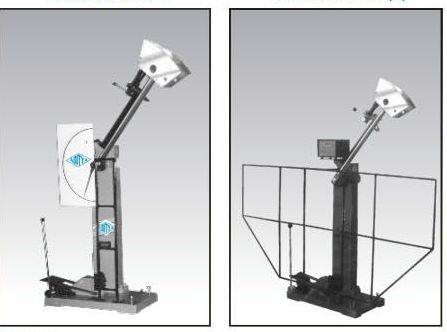sales@adityainstruments.co.in - GST NO. : 27AFOPC9275N1ZN
Digital Impact Testing Machine - Advancing Accuracy In Material Testing
Posted by Admin on November, 01, 2024

A digital impact testing machine defines the resistance of a material or component to a rapid load under varying temperature conditions through digital data. Reliant on the material to be tested, the end-use application necessities, and the chosen type of test data, a choice is made between pendulum effect testers and drop-weight impact testers. As their names suggest, specimens are either struck by a swinging pendulum or hit by a falling weight. In each case, the weight, the discharge height or drop height, and the type of striking hammer or tool that influences the specimen are pre-defined, and the machine is set up consequently.
How does digital impact testing words?
In the case of digital impact testing a sample material has to be put in a testing chamber and the pendulum or hammer is swung on it. It is a new digital force that measures the energy absorbed in the sample in case of an impact. Modern digital impact testing machines are capable of such test parameters, and quick data analysis and include easy-to-use software which makes them versatile. Critical data points such as peak load, energy absorbed, and deformation measurements are recorded in real-time, and real-time analysis is made to predict material properties.
What are the different Applications of digital impact testing in the Industry?
These dynamic testing systems are popular in sectors where material performance is significant. For instance, in automotive and aerospace industries parts are subjected to hard forces of pull and push. Motion impact testing reduces risks associated with high-time stressfulness by providing manufacturers with confidence that components can perform as desired. Likewise, iron, cement, and other building materials are checked and analyzed in the construction sector to verify that they fulfil safety measures and codified guidelines. Through the use of digital impact testing machines, changes can be made easily and quickly and accuracy is improved for safety in these industries.
Pros in digital impact testing machines
Digital impact testing machine offer several advantages over traditional mechanical testers:
Higher Efficiency – A few of these instruments utilize electronic sensors and numerous precise software thus improving productivity and minimizing mistakes from human operators.
Real-Time Data Acquisition – The data received is in real-time, and changes can hence be made in the actual concentrations of materials used or the test parameters as soon as the data is received.
Speed – The digital process is normally faster than traditional ASP methods, which is a plus in situations when a large number of tests need to be conducted. Also, the digital machines used in the textile industry are helpful in stocking data to monitor the performance of a material for an extended period.
Test Flexibility - Some of the most effective digital impact testing machines are programmable to accommodate variations in the material as well as the standard, meaning that the same machine can be used for different tests.
Qualities of digital impact testing machines supplier
- Technical expertise and industry experience
- Quality of equipment
- Customization capabilities
- Advanced technology and innovation
- Excellent customer support and training
Search
Category
Recent Posts
- How Metal Safety Depends on a Vickers Hardness Testing Machine
- Electronic Universal Testing Machine - Product, Benefit & Feature
- What to Expect from a Good Torsion Testing Machine Exporter
- How Rockness Hardwell Testing Machine Ensures Material Quality and Strength?
- Brinell hardness testing machine: An effective means of assessing material hardness

Leave a Comment